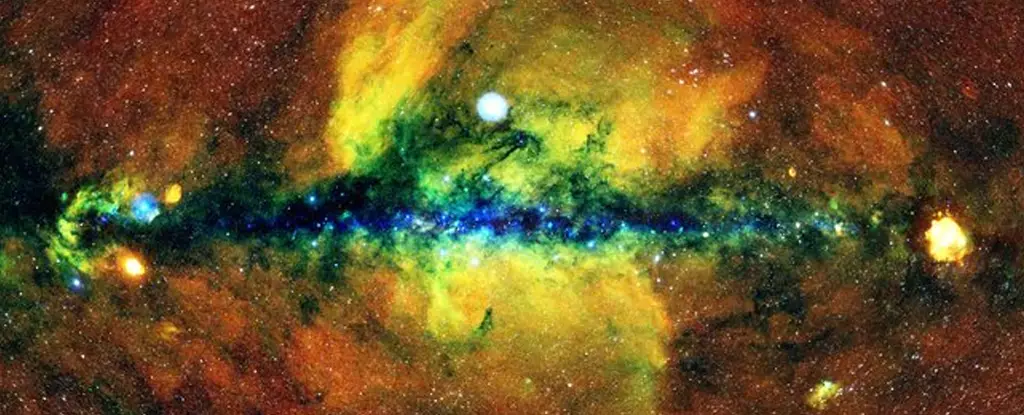In the realm of science fiction, the concept of possessing X-ray vision has captivated the imagination of many. The ability to see through solid objects and delve into the mysteries hidden within is a fantasy that has long eluded humanity. However, scientists have devised a groundbreaking method to bypass this physical barrier and peer into the darkest corners of the cosmos. X-ray astronomy, a field that has thrived for six decades, enables us to observe some of the most explosive and energetic phenomena in the Universe. From dazzling quasars and explosive supernovae to intergalactic gas flows and nascent stars, X-ray astronomy unveils a realm of celestial occurrences that were once unimaginable.
Recently, the eROSITA consortium at the Max Planck Institute for Extraterrestrial Physics announced a momentous milestone in X-ray astronomy. The consortium unveiled the latest trove of X-ray data from the eROSITA survey, which encompasses a remarkable half of the X-ray sky. This extraordinary dataset provides invaluable insights into approximately 900,000 distinct X-ray sources, surpassing the cumulative discoveries made by previous X-ray observatories such as Chandra. eROSITA, situated aboard the Spectrum-RG satellite, boasts cutting-edge soft X-ray imaging technology to capture these awe-inspiring phenomena. Over a span of 7 months from December 2019, eROSITA executed its first all-sky survey, dubbed eRASS1, during which it detected a staggering 170 million X-ray photons at its most sensitive setting.
After concluding this initial survey, eROSITA carried out three subsequent scans of the entire sky between June 2020 and February 2022. These subsequent surveys amassed an extraordinary treasure trove of X-ray data, one that will soon be unleashed upon the scientific community. Through the lens of the eROSITA telescope, the Universe is laid bare, providing an unprecedented wealth of information for researchers to unravel the enigmas hidden within celestial objects.
X-ray astronomy directs its focus towards objects and events that harbor intense heat and energy. Among these captivating entities are the cores of galaxies, housing supermassive black holes that exert an incomprehensible gravitational pull. Other remarkable cosmic phenomena include supernova explosions that reverberate across the cosmos, the birthing grounds of young, scorching stars, and the blistering hot regions where matter attains mind-boggling temperatures. The preliminary eRASS1 dataset is an astronomical goldmine, pinpointing approximately 710,000 supermassive black holes, 180,000 X-ray-emitting stars within the Milky Way, and 12,000 galaxy clusters. Furthermore, this comprehensive survey encompasses a handful of other extraordinary sources such as X-ray-emitting binary stars, remnants of supernovae, pulsars, and an array of enigmatic objects.
According to Andrea Merloni, the eROSITA principal investigator and the lead author of the eROSITA catalog paper, the sheer number of discoveries is staggering, exceeding the cumulative achievements of missions such as XMM-Newton and Chandra, which have spanned nearly a quarter-century. The progress achieved within a mere six months has propelled X-ray astronomy to new heights of exploration.
The first data release from eROSITA presents a multifaceted look at the Universe in varying X-ray energy levels. Each energy level provides astronomers with unique insights into the underlying mechanisms driving the emission of X-rays. To supplement these groundbreaking images and data, the eROSITA consortium enriches the dataset with invaluable information concerning the classification of sources, their precise positions in the sky, energies emitted, and the precise arrival times of photons to the instrument. This meticulous attention to detail ensures the release of high-quality data and software, fostering a global network of scientists equipped to work with high-energy data and further pushing the boundaries of X-ray astronomy.
Unveiling Cosmic Structures and Galactic Phenomena
The extraordinary capabilities of eROSITA have unveiled a tapestry of cosmic marvels since its launch in June 2019. As the telescope scoured the expanse of the sky, it witnessed profound transformations within a distant quasar named SMSS J114447.77-430859.3. These fluctuations shed light on the black hole residing at the heart of the quasar, offering valuable clues regarding its growth. Variations in brightness indicated the absorption of material by the black hole, while powerful winds propelled some remnants away from its voracious grasp. Furthermore, eROSITA detected a nascent black hole in the early stages of its formation, peering into the primordial depths of the Universe. Closer to home, this remarkable instrument unveiled a scintillating glimpse into the all-encompassing hot gas pervading our own Milky Way.
The first light captured by eROSITA on October 22, 2019, marked a monumental leap forward in X-ray astronomy. Nevertheless, the present state of the instrument is in safe mode while technicians diligently assess its health and operational status, orchestrating its return to the forefront of exploration.
X-ray astronomy has shattered the barriers that once hindered our ability to observe the most extreme and enigmatic celestial phenomena. With the aid of eROSITA, researchers have unlocked a treasure trove of X-ray data that transcends the cumulative discoveries of preceding missions. This extraordinary dataset holds the key to exploring the mysteries hidden within the cosmos and propelling the frontiers of astronomical knowledge to unprecedented territory. As eROSITA unveils the energetic secrets of the Universe, humanity’s understanding of the cosmos will continue to evolve in ways that were unimaginable just a few decades ago.


Leave a Reply